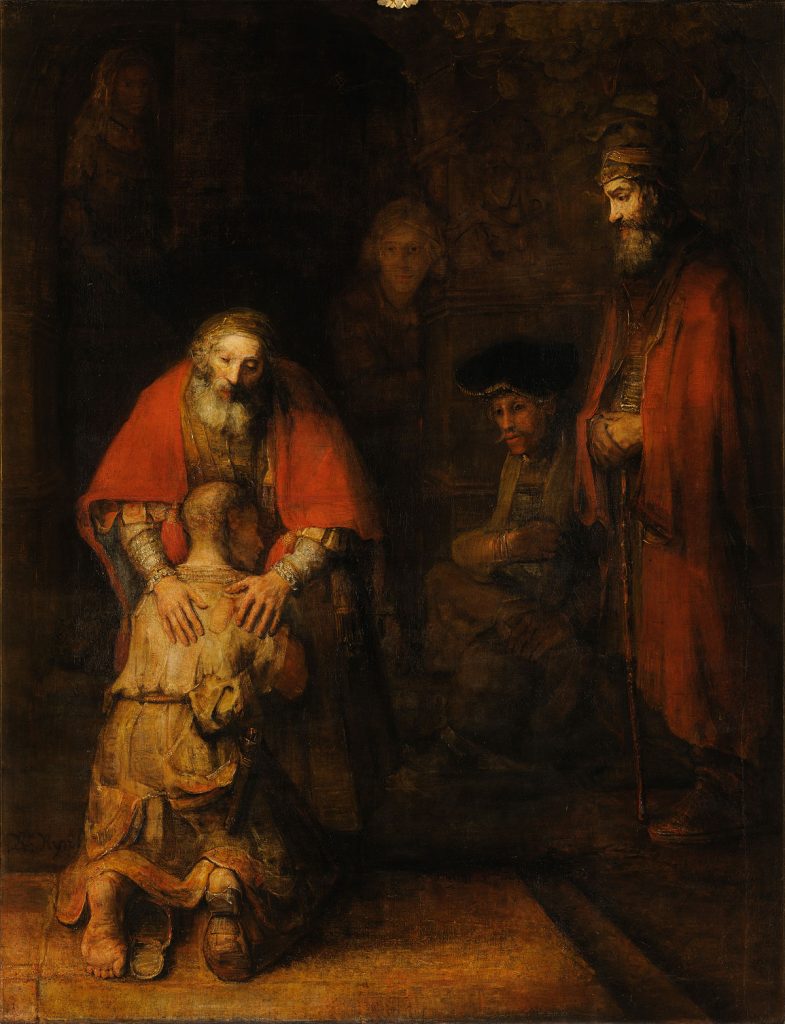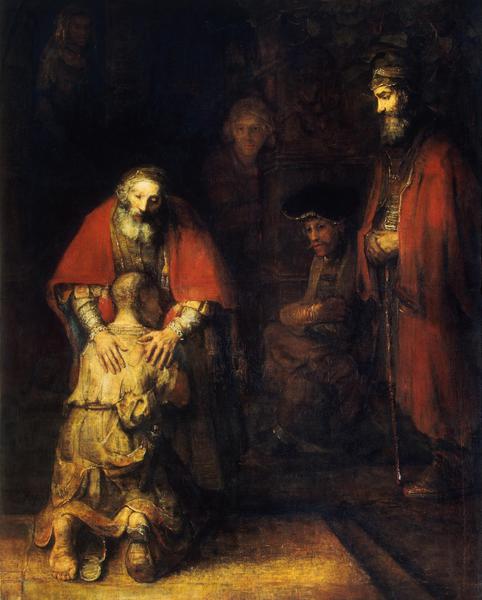In his book, The Return of the Prodigal Son: A Story of Homecoming, Fr. Henri J. M. Nouwen writes about his encounter with Rembrandt’s painting of the same name based upon Jesus’ parable in Luke 15:11-32. Within the book, Nouwen explores three major themes: 1) how each of us is the spendthrift, prodigal, younger son, and the judgmental, resentful, elder son; 2) how Jesus perfects both the younger and the elder son; and 3) how we are ultimately called to become the loving, forgiving father. As additional background material for our discussion, I am using Kenneth Bailey’s The Cross and the Prodigal: Luke 15 Through the Eyes of Middle Eastern Peasants. This Lenten study covers five weeks.
(Lent 2016)
The Return of the Prodigal Son – An Introduction
The major themes are (i) how each of us are each of the sons, (ii) how both sons are perfected, adn (iii) how we are ultimately called to be the Father.
The Return of the Prodigal Son, Ch.1-2: The Younger Son Leaves, pt.1
The younger son is not merely wishing his father dead so that he can take ownership of his stuff, but to be cut off from what it means to be called a son in exchange for mere cash.
The Return of the Prodigal Son, Ch.1-2: The Younger Son Leaves, pt.2
In reviewing the parable, we will look at (i) the historical context, (ii) re-tell the parable in a contemporay idiom, (iii) plumb the spiritual meaning, and (iv) place ourselves in the story.
The Return of the Prodigal Son, Ch.3: The Younger Son Returns, pt.1
In making his decision to return home, has anything really changed about the younger son? Is the younger son’s request simply driven by selfish desire or is he beginning to realize the true nature of his relationship with the father?
The Return of the Prodigal Son, Ch.3: The Younger Son Returns, pt.2
Is repentance and reconciliation within the contemplation of the younger son? Does he anticipate any change in his relationship with the father? At this point in the story, has the younger son learned anything from his experience? Do you agree with Fr. Nouwen that Jesus himself can be seen as the younger son?
The Return of the Prodigal Son, Ch.4-6: The Older Son, pt.1
Nouwen calls the older son’s resentful conduct the “frozen anger among the saints.” This anger develops into a “pathology of darkness” from which the older brother cannot escape.
The Return of the Prodigal Son, Ch.4-6: The Older Son, pt.2
What is the basis of the older son’s relationship with the Father? Is there any hope for the elder son?
The Return of the Prodigal Son, Ch.7-9: The Father, pt.1
In th epainting, look at the father’s hands. The father’s left hand is masculine and grasps the son tight, whereas the right hand is feminine and rests gently on the younger son to comfort him as only a mother can.
The Return of the Prodigal Son, Ch.7-9: The Father, pt.2
At the end of each parable in Luke 15, the main character goes to their neighbors and says rejoice with me for that which was lost has been found. Think about how we, as the Church, are called to this rejoicing.
The Return of the Prodigal Son, Conclusion, pt.1
Fr. Nouwen posits that the ultimate lesson of the parable, and indeed the core message of the Gospel, is that we are to become like the Father. We are called to imitate the compassionate God that is disclosed to us as the compassionate father in the parable.
The Return of the Prodigal Son, Conclusion, pt.2
Salvation is not a change in location but a change in being. It is not about going to Heaven but becoming the Father in whose likeness we are to become.
A Sermon on the Parable of the Prodigal Son
The purpose of the parable isn’t to teach us that God will always welcome us home or to be a joyful rule follower. Rather, the heart of the parable, and indeed the very heart of the Gospel, is to teach us what it means to become the Father.
Finding the God Who is Love
In his alienation and guilt, the prodigal is no longer capable of seeing his father as he really is. Instead of a parent abounding in love and care, he has substituted an overseer of exacting justice.



